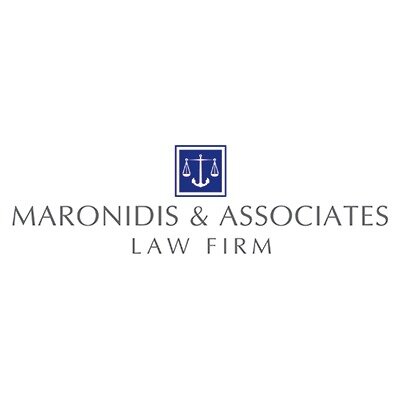Best Restructuring & Insolvency Lawyers in Thessaloniki
Share your needs with us, get contacted by law firms.
Free. Takes 2 min.
List of the best lawyers in Thessaloniki, Greece
About Restructuring & Insolvency Law in Thessaloniki, Greece
Restructuring and insolvency law in Thessaloniki, Greece, is designed to address financial distress affecting businesses and individuals. Thessaloniki, as Greece’s second-largest city and a key economic hub, has seen significant growth in business activity, making robust legal procedures crucial for handling financial difficulties. The legal framework enables companies and individuals to seek remedies, protect assets, and reach agreements with creditors. The focus is on providing solutions that might allow for a business’s survival or, if necessary, efficiently liquidate assets and settle debts. Whether you are a business owner, creditor, investor, or an individual facing insolvency, understanding the local procedures and legal options is essential.
Why You May Need a Lawyer
Several situations may require the expertise of a restructuring and insolvency lawyer in Thessaloniki. Common scenarios include:
- Business owners experiencing ongoing financial strain or unable to meet financial obligations
- Creditors seeking to recover debts or protect their interests during a debtor’s insolvency process
- Individuals overwhelmed by personal debt and needing guidance on debt restructuring or bankruptcy procedures
- Companies considering mergers, acquisitions, or asset sales as part of their restructuring plan
- Stakeholders in a business that is entering insolvency, dissolution, or liquidation
- Those seeking court representation or advice during negotiations with creditors or debtors
- Directors and managers wishing to understand their obligations and risks regarding insolvency
Given the complexity of Greek insolvency and restructuring law, a lawyer can help navigate procedures, negotiate with parties, ensure compliance, and maximize your legal protections.
Local Laws Overview
Greece’s insolvency regime has undergone significant changes in recent years, harmonized with European Union standards. The key legal instruments include:
- The Bankruptcy Code (Law 4738/2020), which covers the insolvency of both individuals and businesses
- Pre-insolvency and restructuring procedures, aiming to prevent bankruptcy and to preserve viable businesses
- Debt restructuring frameworks, including out-of-court settlements and judicial restructuring plans
- Special provisions for micro and small enterprises, accounting for simpler restructuring procedures
- Orderly liquidation processes, where asset distribution among creditors follows strict legal priorities
- Protection for debtors from enforcement actions while restructuring is underway
The courts of Thessaloniki play a central role in supervising these procedures. Specialized commercial courts handle insolvency filings, approval of restructuring plans, and disputes between parties. Local legal practices are aligned with the broader Greek legal framework but also reflect the unique economic characteristics and needs of businesses in Thessaloniki.
Frequently Asked Questions
What is the difference between restructuring and insolvency?
Restructuring involves reorganizing a company’s or individual’s debts to restore financial stability and avoid insolvency. Insolvency is the legal state where an entity is unable to pay its debts as they fall due, possibly leading to bankruptcy or liquidation.
Can individuals file for insolvency in Thessaloniki?
Yes, both individuals and legal entities can initiate insolvency proceedings under Greek law. Individuals have access to debt settlement and bankruptcy procedures tailored to their needs.
What are the benefits of restructuring instead of liquidation?
Restructuring offers the chance to continue business operations, retain employment, and preserve the value of assets. Liquidation generally means selling off assets and ceasing business.
How long does an insolvency process take in Thessaloniki?
Timelines vary based on case complexity and the chosen procedure. Out-of-court settlements may conclude within months, while court-supervised bankruptcies or reorganizations can take longer, sometimes years.
What protection is available to debtors during restructuring?
Debtors are generally afforded protection from creditor actions (such as asset seizures) during approved restructuring proceedings, offering them time to negotiate and implement a plan.
Are directors personally liable for company debts?
Directors are usually not personally liable, but exceptions exist. For example, liability can arise from wrongful trading or not filing for insolvency in a timely manner.
What role do the courts in Thessaloniki play?
Courts oversee and approve insolvency, restructuring, and liquidation proceedings, ensure compliance with the law, and resolve disputes among creditors or between creditors and debtors.
Can foreign creditors participate in bankruptcy proceedings?
Yes, foreign creditors can make claims and participate in the proceedings under Greek law, with their rights protected in accordance with European regulations and local rules.
What happens to employment contracts during insolvency?
Employment contracts may be terminated or continued based on the circumstances and the restructuring or liquidation plan. Employees enjoy certain protections and priority in creditor claims for unpaid wages.
Is it possible to avoid bankruptcy through an out-of-court settlement?
Yes, the law encourages amicable settlement among debtors and creditors through mediation or negotiated agreements, potentially avoiding formal insolvency procedures when the parties reach a viable compromise.
Additional Resources
Those seeking further information or assistance can contact or consult the following resources:
- Greek Ministry of Justice - information about insolvency procedures and legal updates
- Chamber of Commerce and Industry of Thessaloniki - business support and guidance on restructuring
- Bankruptcy and Restructuring Department of Thessaloniki Courts - local judicial authority handling insolvency cases
- The Economic Chamber of Greece - training and support for professionals dealing with restructuring
- Local bar associations - referrals to qualified restructuring and insolvency lawyers in Thessaloniki
- Trusted accounting and financial advisory firms specializing in insolvency matters
Next Steps
If you believe you may need legal assistance in matters related to restructuring or insolvency in Thessaloniki, consider the following steps:
- Assess your current financial situation and gather relevant documents regarding your assets, liabilities, creditors, and business operations
- Reach out to a qualified lawyer or law firm in Thessaloniki with experience in insolvency and restructuring
- Schedule an initial consultation to discuss your case and receive tailored advice
- Be open and transparent about your financial challenges to allow for accurate legal guidance
- Follow your lawyer’s instructions in preparing and submitting necessary documents to the courts or to creditors
- Stay informed about court dates, deadlines, and your rights during the process
- Consider involving financial advisors or accountants to work alongside legal counsel for the most effective outcome
Early engagement with professionals increases your chances of reaching a favorable resolution, whether through restructuring, an out-of-court settlement, or formal insolvency proceedings.
Lawzana helps you find the best lawyers and law firms in Thessaloniki through a curated and pre-screened list of qualified legal professionals. Our platform offers rankings and detailed profiles of attorneys and law firms, allowing you to compare based on practice areas, including Restructuring & Insolvency, experience, and client feedback.
Each profile includes a description of the firm's areas of practice, client reviews, team members and partners, year of establishment, spoken languages, office locations, contact information, social media presence, and any published articles or resources. Most firms on our platform speak English and are experienced in both local and international legal matters.
Get a quote from top-rated law firms in Thessaloniki, Greece — quickly, securely, and without unnecessary hassle.
Disclaimer:
The information provided on this page is for general informational purposes only and does not constitute legal advice. While we strive to ensure the accuracy and relevance of the content, legal information may change over time, and interpretations of the law can vary. You should always consult with a qualified legal professional for advice specific to your situation.
We disclaim all liability for actions taken or not taken based on the content of this page. If you believe any information is incorrect or outdated, please contact us, and we will review and update it where appropriate.
















